Before Malcolm X went to Africa, he was a Black nationalist and member of the Nation of Islam. By the time he left, he had become a Pan-Africanist, fighting an anti-imperialist struggle. African Stream tells the story of Malcolm X’s political transformation that led to his assassination a few months after his return.
Related Articles
Related Articles
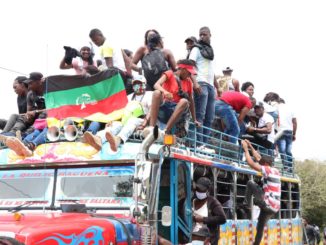
Racism, Exclusion and State Violence: The Brutal Repression of Peaceful Protest in Colombia
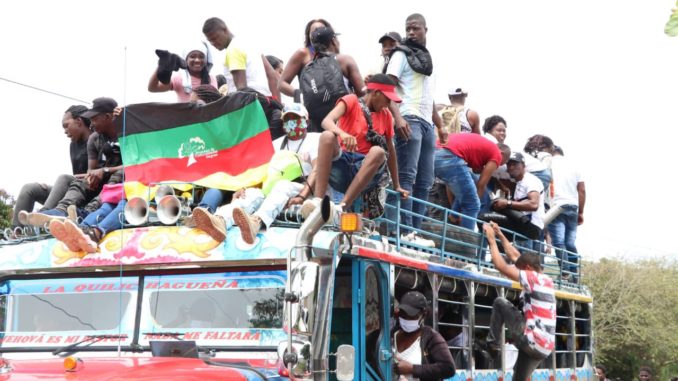
Mobilizations took to the streets of Colombia on April 28 in a national strike to protest social injustice and aggressive tax reforms proposed by the Iván Duque government. Student movements, trade unions, young peoples’ organizations, feminist groups, and indigenous and Afro-descendant peoples’ movements marched, blocked roads and held cultural activities in urban centers and rural territories throughout the country, exercising their right to peaceful protest. But the state wasted no time in responding with violent repression, especially in major cities such as Calí, Bogotá, Palmira and Popayán.
Watch to understand what is happening in Colombia #SOSColombiaEnDictadura #soscolombia #Colombia #AlertaRojaEnColombia pic.twitter.com/v0FdocxS6g
— Victor (@victor4nj) May 8, 2021
Although the vast majority of protests have been peaceful, isolated incidents of looting and violence have been used as an excuse for using excessive force against protesters. Media discourses around “good protesters” and “bad protesters” legitimize this response. Widespread reports of infiltrators are being used to provoke violence and looting, as has been the case in previous strikes in the country. Armed forces reportedly have stood by and allowed looting to take place, only to later respond to such incidents with violent repression.
Rather than heeding the demands of the citizens against the tax reform and social injustice, the state has responded with militarization, turning peaceful demonstrations into scenes of war. Helicopters circle above protest points and communities, while tanks thunder through narrow city streets.
This breaks my heart to see this. What kind of government sends a FUCKING HELICOPTER TO SHOOT CITIZENS IN BROAD DAYLIGHT.
🆘🇨🇴🙏🏽 #Prayforcolombia #SOSColombiaNosEstanMatando #SOSColombiaEnDictadura #ColombiaAlertaRoja #COLOMBIAINREDALERT #ColombiaResiste pic.twitter.com/tevBbcnCtC— 𝐓𝐫𝐮𝐞𝐞 𝐊✯ (@Truee_K) May 5, 2021
Several cities are occupied by four armed state actors:
- armed police,
- Escuadrón Móvil Antidisturbios (ESMAD, or Mobile Anti-Riot Squads of the National Police),
- military forces and
- Grupo Operativo Especial de Seguridad del Cuerpo Nacional de Policía (GOES, or Special Security Task Force of the National Police Force).
Instead of seeking to pacify the situation and protect citizens, these forces have increasingly threatened security, peace and human rights.
Flagrant Human Rights Abuses
Countless videos recorded by protesters and onlookers circulate daily on social media, showing cases of police brutality, indiscriminate shootings, and the use of tear gas inside barrios that contain children and elderly people. Over the past few days, the violence has taken on a new face in Calí, with the presence of plainclothes police officers and reports of unmarked cars carrying out drive-by shootings against protesters.
Bogotá-based non-governmental organization Indepaz reports the following occurred between April 28 and May 8:
- 47 murders (the majority of whom have been young adults and 4 of whom were minors),
- 12 cases of sexual violence,
- 28 eye injuries,
- 1,876 acts of violence,
- 963 arbitrary detentions and
- 548 forced disappearances.
Reports are circulating of people being arrested and denied information of their destination, violating their rights to due process and exposing them to the risk of arbitrary detention, cruel and inhumane treatment, and forced disappearance.
Armed police have threatened lawyers and human-rights defenders when inquiring about missing people at police stations. The international community woke up to the seriousness of the situation when, on May 3, members of a humanitarian mission including UN and state representatives were attacked by armed police while waiting to enter a police station in search of missing people. On April 7, as a humanitarian mission was taking place north of Calí with the presence of Senator Alexander Lopez, a drive-by shooting took place, injuring one person and killing three.
The Racialization of State Repression
The violence and repression has a disproportionate impact on Black communities, only mirroring Colombia’s ongoing internal armed conflict. For example, 35 of the 47 murders Indepaz reported took place in Calí, home to South America’s second-largest Afro-descendant population. No surprise that structural and systemic racism are deeply ingrained in Calí. Many of the most aggressive cases of state violence have been carried out in neighborhoods with majority or significant Afro-descendant populations, treating communities as enemies of war. Historically, these barrios have suffered socio-economic exclusion, further entrenched by the impacts of the COVID-19 pandemic, structural racism and state violence. Many barrio residents already were victims of forced displacement, having fled the armed conflict in the majority Afro-descendant regions of the northern Cauca Department, in which Calí is located, and the Pacific coast.
While official statistics do not reveal the proportion of Black victims in this current wave of police brutality due to a lack of disaggregated data, photos of victims clearly show the disproportionate impact on young Afro-descendant men.
#Alerte 🚨🗣
En Puerto Tejada Norte del Cauca el ESMAD ataca a los manifestantes que marchan pacíficamente, denunciamos el abuso de autoridad y violación a nuestros derechos #SeValeProtestar #ParoNacional28A #ResistirNoEsAguantar@DefensoriaCol @ONUHumanRights @FranciaMarquezM pic.twitter.com/WsPKoKqa4c— PCN (@renacientes) April 28, 2021
Racial profiling not only underpins state violence, but is central in the denial of state responsibility and impunity. Already, discussions around existing gang violence and urban conflicts are being used to question whether many of these young men participated in the protests or were delinquents killed in the context of the everyday violence in their communities. This discourse no doubt seeks to reduce the numbers of protest-related deaths, simultaneously justifying the deaths of young Black men. The first death registered in Calí took place in the majority Black barrio, Marroquin II, where a 22-year-old man was killed. But the military later denied his death was related to the protests.
Militarization, Imperialism and the Protests
The current situation in Colombia cannot be understood in isolation from the wider armed conflict and the ever-deepening neoliberal agenda supported and sustained by the United States and multinationals that feed off Colombia’s natural resources. U.S. imperialist interests in the region have been clear since the late 19th century, with the attempted invasion of Colombia’s neighbor, Panama, in 1885 and the start of the Panama Canal project in 1904. In 1948, the Organization of American States was created during a meeting in Colombia.
Colombia has been the strategic point for Washington’s political, economic and military operations in recent decades. Thanks to U.S. technical and logistical support, Colombia is now one of the greatest military powers in the region. With the 1999 signing of Plan Colombia and the 2002 Patriot Plan, U.S. military presence and influence has only deepened.
Further, U.S. military support has always depended on state policies that benefited U.S. imperial interests. For example, in 2009 the United States signed an agreement with the Uribe Government to be able to operate from seven Colombian military bases. Although this agreement was blocked by the Constitutional Court, the Santos government later arrived at alternative bilateral agreements. These enabled access and use of the bases in practice, and further facilitated the fruitless and dangerous strategy of spraying the herbicide, glyphosate, on illicit crops. All of this sustains the ideology of the “internal enemy” and the terrorist threat that underpinned the original emergence and expansion of paramilitarism in the 1980s.
It is precisely this paramilitarism model the Colombian state is using in the context of the current protests, particularly in Calí, where state agents, often without proper identification, collaborate with civilians to shoot and kill protesters from high-end cars. The Indigenous Guard, accompanying the protests in Calí, have suffered several attacks of this kind, most recently on May 9, when eight people were wounded.
This violent state repression is yet another consequence of imperialist intervention and the extractivist neoliberal project that uses militarism to eliminate a historically racialized population it considers residual as well as a threat to the capitalist, white-supremacist order.
Esther Ojulari is a human-rights and racial-justice activist and sociologist. She is a Ph.D. candidate at the University of London, writing on transitional justice and reparations for the Afro-descendant people in Colombia. She worked for eight years as a consultant in the Office of the United Nations High Commissioner for Human Rights (OHCHR) on Afro-descendant rights. Esther is currently Regional Coordinator in Buenaventura, Calí and Northern Cauca for the Consultancy for Human Rights and Displacement (CODHES). She is a member of several Afro-descendant and African-led international networks and coalitions.
Harrinson Cuero Campaz is a Afro-Colombian rights activist. He is a Ph.D. candidate writing on sustainability in urban and regional planning for biologically and culturally diverse territories. He is a social activist and member of the Proceso de Comunidades Negras (PCN, or Black Communities Process). Harrinson currently works as regional representative of Consultancy for Human Rights and Displacement (CODHES) and as a coordinator for the formulation of the Special Territorial Plan of the District of Buenaventura 2021-40.
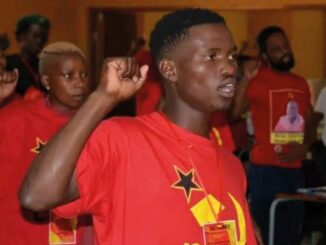
Police Reportedly Shoot and Abduct Swaziland Communist Amid Protests Against Africa’s ‘Last Absolute Monarchy’
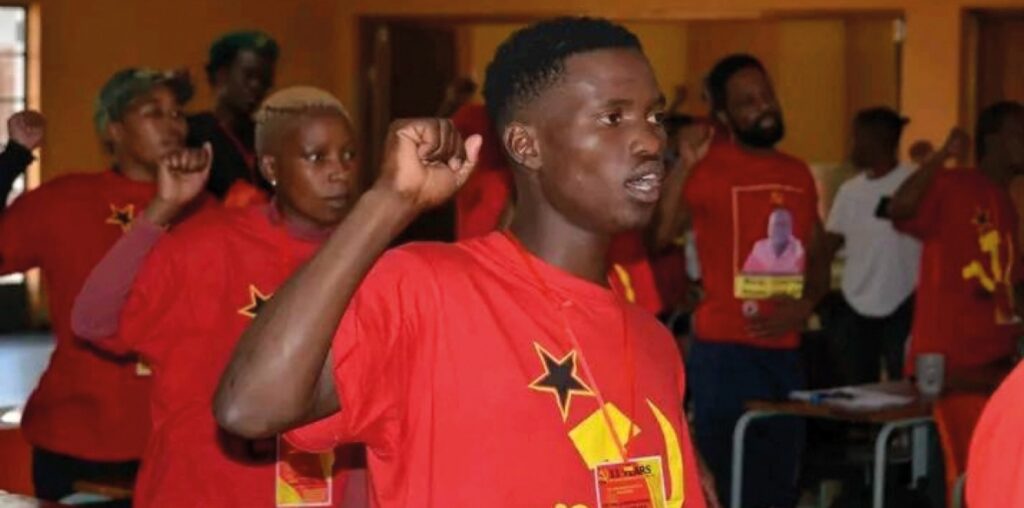
Editor’s Note: This article originally appeared in Peoples Dispatch.
The Communist Party of Swaziland (CPS) reported on February 28 that the police force of Africa’s last absolute monarchy has shot and disappeared one of their members, Mvuselelo Mkhabela, age 21. “Comrade Mvuselelo was badly shot at and dragged to the police van helplessly and his whereabouts and condition is unknown and the armed to teeth police force continued its attacks to the protesting community,” CPS tweeted. Reportedly this abduction happened at around 13:00h (local time) on February 28.
This latest act of violence by the Swaziland police force comes amid an uptick in police repression of recent protests against the “farcical” parliamentary elections. CPS claims that the elections are a farce because the parliament itself is under the control of the monarchy, so the electoral process constitutes “a tool used by the absolute monarchy to sanctify King Mswati’s decision.” Mvuselelo himself was arrested and tortured earlier this month for protesting these elections, which are set to occur this August. Shortly after his arrest, Mvuselelo told Peoples Dispatch, “Often, when [police] invade communities, there is no one to defend the family or the individual from the wrath of the regime. This cannot go on.” Mvuselelo was abducted today in one such police invasion.
Communists in Swaziland have been involved in a struggle against the monarchy for decades. In recent months, the regime led by King Mswati III has intensified attacks against pro-democracy activists, including the assassination of human rights lawyer Thulani Maseko, threats against union leader Sticks Nkambule, torture of union leader Mbhekeni Dlamini, and more.
“Mvuselelo’s consciousness and commitment to the just course of the people of Swaziland fighting for democracy in the face of a militarized system of oppression presided by Mswati and his political elites remains unwavering,” CPS wrote in a tweet.
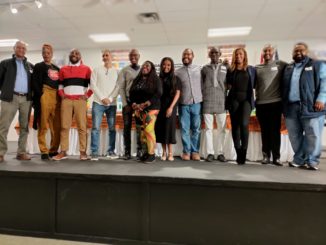
‘Economic Development As a Human Right’: First Panel of African Peoples’ Forum
Editor’s Note: This panel discussion was produced by the African Peoples’ Forum.
Journalist and activist Elias Amare, U.S./Africa Bridge Building Project Director Imani Countess, American Ethiopian Public Affairs Committee (AEPAC) organizer Elias Hiruy, and medical doctor and #NoMore Movement co-founder Simon Tesfamariam discussed economic development as a human right at the first-ever African Peoples’ Forum. The event was held December 11 at the Eritrean Civic & Cultural Center in Washington, D.C. Journalist Hermela Aregawi and activist Yolian Ogbu moderated.
TF editor Julie Varughese reported on this event being held to counter the Biden administration’s U.S.-Africa Leaders Summit.
